“The Most Toys”
Written by Shari Goodhartz
Directed by Timothy Bond
Season 3, Episode 22
Production episode 40273-170
Original air date: May 7, 1990
Stardate: 43872.2
Captain’s Log: In order to stop the tricyanate poisoning of the water supply on Beta Agni II, the Enterprise has obtained hitritium, a highly unstable compound, from a trader named Kivas Fajo. Hitritium is too unstable to transport, so Data flies it from Fajo’s ship the Jovis to the Enterprise in a shuttle.
As he’s about to take his third and final trip, Varia, Fajo’s aide, neutralizes Data with some form of electrical shock and examines his molecular structure. A few minutes later, the shuttle leaves the Jovis and explodes.
The Enterprise crew thinks Data has been destroyed with the shuttle (Varia left enough trace elements of what he’s made of to fool a scan). They must proceed to Beta Agni II, so off they go—unknowingly leaving Data behind.
Fajo, it turns out, is an obsessed collector-type, and like all obsessed collector-types he has a particular type of object he prefers: unique items that cannot be found anywhere else from paintings to sculptures to weapons to other apocrypha, including a Lapling, an animal believed extinct. Of course, unlike the other items, Data is sentient and objects to being kidnapped. Fajo, however, views Data as the jewel of his collection. Fajo has a personal force field that reacts only to Data, preventing the android from touching him, and the trophy room has a door that only responds to galvanic skin responses and DNA, and is also excessively heavy, so even he can’t open it. Data objects, and Fajo counters—they debate spiritedly, but Data is still trapped in the room. Fajo even contrives to destroy Data’s uniform, thus forcing him to wear the (butt-ugly) clothes Fajo wants him to wear. Data, however, refuses to sit in the chair that Fajo has set aside for him to be displayed in.
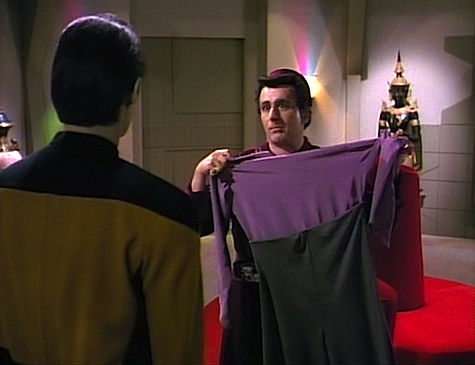
Fajo brings a colleague/rival named Palor Toff on board to show off Data. However, Data stands completely, unmovingly still as only he can. Instead of getting to show off an android, it appears to Toff as if Fajo is just displaying a dull mannequin. Even when Fajo hits Data with the force field, Data simply falls over. “He falls well,” Toff says, unimpressed. Fajo, though, is livid.
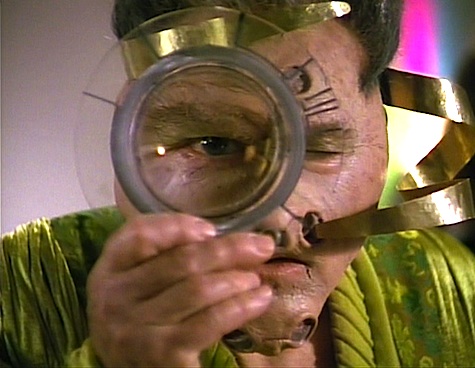
Back on the Enterprise, La Forge and Wes go through Data’s things: his latest painting, his violin, a Shakespeare volume given to him by Picard (which La Forge gives back to the captain, who quotes Hamlet from it during the episode in remembrance of Data), his poker cards and chips (which Wes thinks should go to Riker), his impressive collection of Starfleet medals, and his hologram of Tasha Yar.
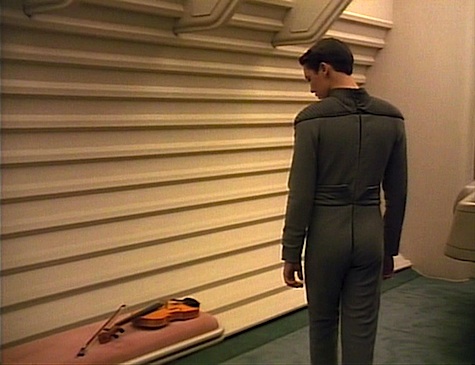
La Forge is also convinced that something’s wrong with the explosion. The only explanation that makes sense is pilot error—which makes no sense when Data’s the pilot. His engineer’s brain wants it all to make sense, but it doesn’t.
And then he hits on it: on the last run, Data did not inform the Enterprise that the shuttle cleared the cargo bay of the Jovis, which he did do the first two runs. Anybody else, it wouldn’t be worth remarking on, but Data not following standard procedure is unheard of. But even as La Forge and Wes go over the shuttle recordings, they have no idea what it all means.
Picard and Riker agree to have Worf replace Data at ops. They arrive at Beta Agni II. The hitritium they have would appear to be just enough to stop the tricyanate contamination. But Worf reports that the hitritium is affecting the tricyanate faster than expected—further, there’s no geologic instability that would explain the tricyanate. Riker, Worf, and Crusher beam down and discover that the tricyanate is artificial. But tricyanate is not the most efficient method of poisoning a water supply; the only possible reason to do it is because hitritium is so hard to find. Which means it was darn fortunate that Fajo had some, and just enough to solve their problem.
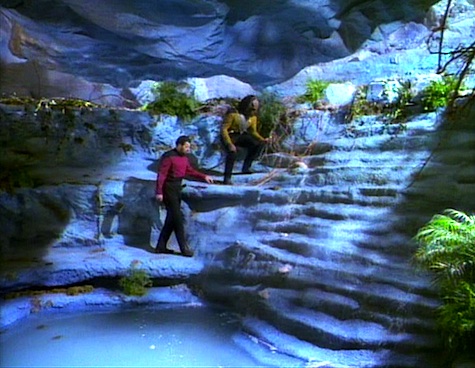
A look into Fajo’s record reveals that he’s a collector of rare and unique items, at which point the other shoe drops.
The Enterprise warps to where the Jovis was last reported. Meanwhile, Fajo threatens to use his Varon-T disruptor—one of four that Fajo has (there are only five in existence)—on Varia unless Data sits in the chair. Data accedes, but Varia is shaken by the experience and helps Data attempt escape.
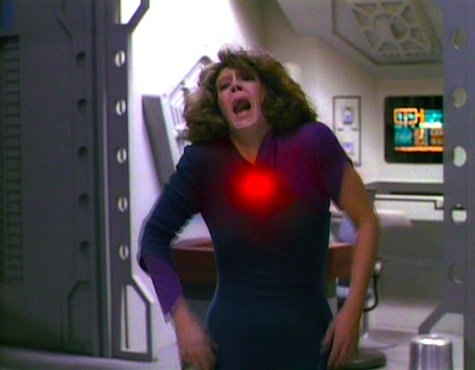
The attempt fails, as Fajo kills Varia with the disruptor—a vicious, violent, awful death—leading Data to aim a disruptor of his own at Fajo. The Enterprise arrives and O’Brien transports Data away before he has the chance to fire—but O’Brien tells Riker that the disruptor was firing during the beam-out. O’Brien neutralizes the weapon, and Data says that perhaps something happened during transport.
Fajo is captured, his collection confiscated, his future bleak. Data “taunts” him one last time by telling him that he feels no pleasure in his incarceration. “I am only an android.”
Can’t We Just Reverse the Polarity?: Hitritium is extremely unstable, so much so that if containment is breached, it can blow up a shuttle. But it’s the only thing that will stop tricyanate—faster if the tricyanate is artificial.
If I Only Had a Brain : Data takes every opportunity to spoil Fajo’s fun—but does so methodically and meticulously, even going so far as to state that he must attempt escape before calmly walking over to the door to try to force it. It’s especially amusing that his most successful endeavor is when he stands stock still and does absolutely nothing. He also occupies himself while alone by feeding the Lapling and trying to impersonate the Mona Lisa’s smile.
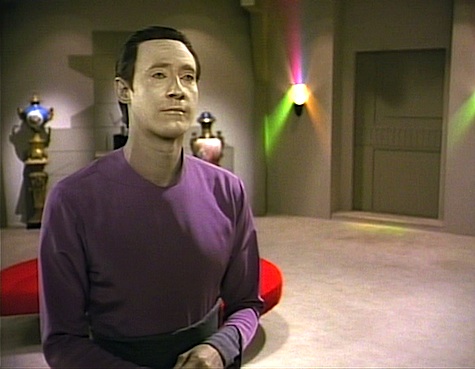
Thank You, Counselor Obvious: Troi expresses concern to Worf over how he feels replacing a dead crewmate for the second time (having already replaced Yar after she died in “Skin of Evil“).
There is No Honor in Being Pummeled: Worf deflects Troi’s concerns, pointing out a) that he has served at ops before (in various first-season episodes, most notably “The Naked Now“), b) that serving in place of a crewmate who died is commonplace on Klingon ships, and c) that he intends to honor Data the same way he honored Yar, by serving as well as he can in their former posts.
The Boy!?: Wes helps La Forge work through Data’s last minutes to see if they can figure out what happened. They fail.
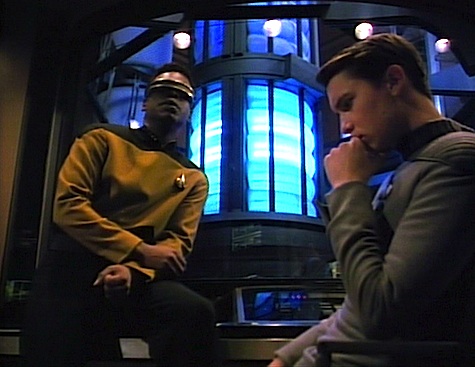
I Believe I Said That: “It’s so single-minded, isn’t it?”
“Very persistent.”
“But it’s very polite, which is a very nice touch.”
Fajo and Varia discussing Data as if he wasn’t right there in the room with him.
Welcome Aboard: Nehemiah Persoff makes a very entertaining cameo as Toff, and Jane Daly does well in a fairly standard role; the moment where she touches her chin when describing Fajo’s punishments as being as “lavish” as his rewards for loyalty is very compelling.
But the episode is owned by the great Saul Rubinek as Fajo. Best known these days as one of the great character actors of our time generally, and specifically as Artie on Warehouse 13, Rubinek was a last-minute substitute who had asked his old school chum Timothy Bond, the episode’s director, for a tour of the set. But he got a much more detailed tour than expected when David Rappaport could no longer play the role of Fajo due to a failed suicide attempt in the middle of filming. (Another attempt was successful a few months later, just before this episode aired.) Twenty years ago, so much energy was focused on the fact that Rappaport couldn’t do it that Rubinek was kind of lost in the shuffle. But looking back on it now, it’s a superb performance by one of our finest actors.
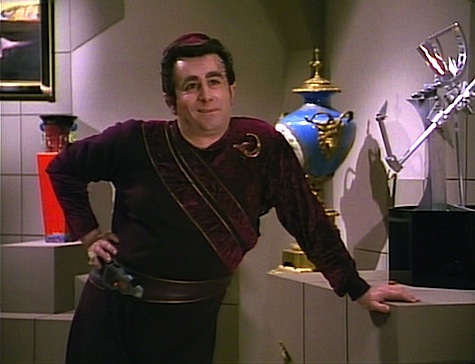
Trivial matters: Kivas Fajo was named after a mineral mentioned in “The Trouble with Tribbles” and Lolita Fatjo, TNG‘s script coordinator.
Fajo’s collection includes the Mona Lisa by Leonardo da Vinci, a large replica of Salvador Dali’s The Persistence of Memory, a 1962 Roger Maris baseball card (the first card made from Topps’s run that year, as it was the year after Maris broke Babe Ruth‘s single-season home-run record) with the smell of bubblegum preserved, among many other things.
Data’s current painting is the same one of the spatial anomaly from “Time Squared” that Tam Elbrun was admiring in “Tin Man.” Data’s facility with the violin was established in when he played it as Sherlock Holmes in “Elementary, Dear Data,” and the fiddle in his quarters is presumably the same one he played as part of a string quartet in “The Ensigns of Command” (and will play again in “Sarek,” the very next episode after this).
Both the Shakespeare volume and the hologram of Tasha Yar were also seen in Data’s quarters in “The Measure of a Man.”
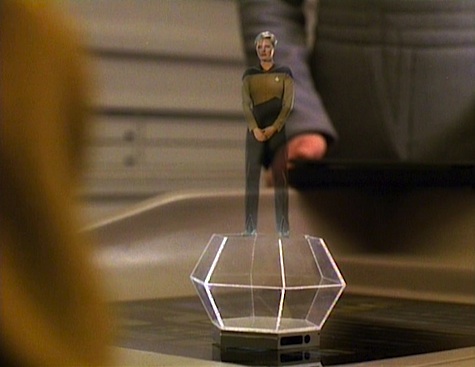
Data’s shuttlepod is the Pike, named after Kirk’s predecessor as captain of the Enterprise, as established in “The Menagerie” and “The Cage” (and, sorta, the 2009 Star Trek).
Make it So: “Mr. Fajo has no moral difficulties at all.” This has always been one of my favorite episodes. The script is fine: Fajo’s abduction of Data is quite clever, Data’s resistance (both active and passive) is completely in character, and Fajo’s collection is entertaining.
However, several elements raise it above fine. First of all, there’s the wonderfully ambiguous ending. Both scriptwriter Goodhartz and Brent Spiner were firmly of the opinion that Data intended to kill Fajo, but Data’s line about something happening during transport casts doubt, since Data isn’t supposed to lie (a line that was apparently inserted at the insistence of the producers).
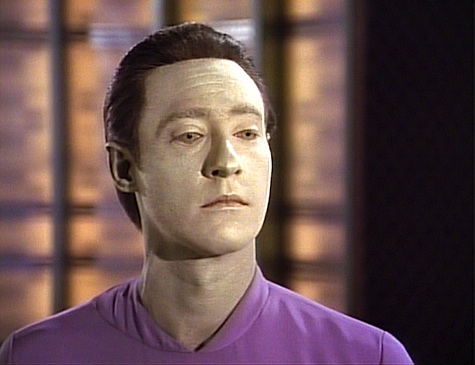
The consequences back on the Enterprise are magnificently played, from Picard and Riker’s professionalism—grieving, but not losing sight of their duty—to La Forge and Wes’s more emotional outbursts to the awkwardness of Worf having to fill Data’s shoes. That last is put in sharp relief when Picard, out of habit, calls for Data to scan Beta Agni II, leading to a most awkward pause before the captain gently apologizes to Worf.
But the main thing that makes this episode stand out is seeing two of the finest actors around, Spiner and Rubinek, going at it. The banter flies beautifully between these two, and it’s just poetry in snark. Add Persoff for a scene, and it’s just gold. Great great stuff.
Warp factor rating: 8
Keith R.A. DeCandido is a writer. No, really!










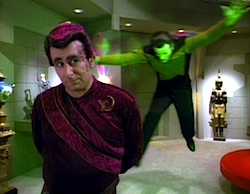


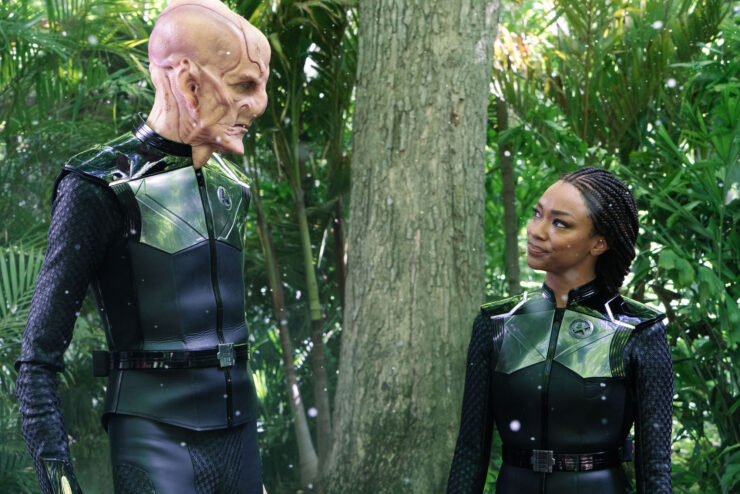

It is amazing that Rubinek and Spiner stood out so much in an episode that was already really good. The other actors, the visual details that contributed to the story, the script itself were all great. You’d think that Data and Fajo would just sort of … blend in. But Data demonstrated sort of in real time why he was worth the (excellently portrayed) mourning, didn’t he?
I always liked the doubt cast by the line that Data says. It does not seem so much like an outright statement as a evasion on his part, which showed a more nuanced character to Data than we had been shown – and maybe a growth for good or ill in his quest to be more human.
What brought it down to an 8 then? I sort of agree with that score based on the quality of the 9s and 10s you’ve already written about, but you didn’t include any qualifying criticism to “bump it down”.
That he had a large print of The Persistence of Memory always bugged me. “Look at these incredible, unique items! Plus, I picked this one up at the museum shop for ten dollars…”
The actual piece is about the size of a shoebox.
No disrespect meant to David Rappaport, but I’m glad Rubinek replaced him. Had Rappaport starred, I would have watched the whole episode thinking “that’s Randal from Time Bandits.” Rubinek’s face was familiar, but I didn’t know him from anything major before, so I was more able to focus on the character.
Any discussion of this episode is lacking without a link to Fashion It So.
Why was Data concerned about wearing nothing after his uniform was dissolved? He could resist by not wearing his provided outfit.
Aside from the weird water poisoning issue, this episode holds together thematically and logically (how often does thathappen?).
And thank you, Skwid!
I’ve always been convinced that Data fired. If he didn’t fire, what possible reason would he have for making such a deliberately ambiguous statement? He would have just said something like, “I did not fire. The disrupter must have malfunctioned.” But “Perhaps something occurred during transport” is such an Aes Sedai line—lying without actually lying. It IS possible that perhaps “something” occured during transport. Of course it is. It’s also possible that perhaps nothing occured during transport. I always interpreted that line as Data admitting it–without admitting in such a way that they would be compelled to pursue any official action against him for firing at Fajo–I mean, as I recall (and correct me if I’m wrong!) Fajo had already dropped his disrupter and was, therefore, unarmed–and Starfleet officers don’t usually make a practice of firing at unarmed civilians, even if they are murderers…
I don’t know what my top 5 episodes of TNG are, but I know this is one of them.
IIRC during the episode Data says something about being programmed with ethics and morals. He sees what a hopeless situation Fajo’s people are in and how evil Fajo is and says “I cannot permit this to continue.”
He is making a logical decision that justice is best served by killing Fajo, even though he knows that isn’t legal, thus the evasive response to O’Brien and Riker.
The episode is an 8 because, honestly, the plot isn’t all that and a bag of chips, and it’s utterly predictable, especially the by-the-numbers climax from Varia’s betrayal to Varia’s death to the Enterprise‘s nick-of-time arrival. I also hate faked deaths because they have a whiff of taking the easy way out — let’s show the grieving process without actually killing anyone! (A well they’ll dip into again in “The Next Phase.”)
It’s a superior example of a tired breed, but a tired breed nonetheless.
—Keith R.A. DeCandido
This was my first exposure to Saul Rubinek, but it wasn’t until his superb turn in Stargate SG-1‘s “Heroes” that I really realized how great an actor he is. I don’t really remember what I thought of him here, because it’s not an episode I’ve wanted to revisit much. I found it somewhat unpleasant in concept and execution, though for the most part I’m not sure I remember my reasons why. Maybe it’s just the venality of the situation, the effort to create an irredeemably evil character and show him doing generally unpleasant things.
But one thing that’s never worked for me is the ending. The idea was to test Data’s ethics to the limit by putting him in a situation where he had no way to stop Fajo short of killing him. But for me, they failed to achieve that, because I thought of a way Data could’ve stopped Fajo nonlethally. The only reason Data couldn’t just physically restrain Fajo is because of the positron-impeding field generated by the box on Fajo’s belt. We know the field wouldn’t have deflected a disruptor bolt, otherwise killing Fajo wouldn’t have been an option at all. So all Data had to do was shoot the box. His aim’s good enough that he could’ve struck the box with a grazing shot, thereby shutting down the field without endangering Fajo’s life. Then it would’ve been a simple matter to restrain him. And if I, a mere human, thought of that, surely Data would have as well. He had an easy way out that he certainly would’ve recognized, and thus he shouldn’t have been the least bit conflicted about what to do.
So for me, the climax completely fails. It’s lame and frustrating when a story alleges to set up an insoluble dilemma but leaves a simple, clear solution because the writers just didn’t think it through well enough.
Count me as another who thinks Data fired. “Something may have gone wrong in transport” my foot.
@11,
I don’t think that the point is that Data had to kill Fajo. I think the point was he wanted to kill him for what he had done to both Varia and Data himself. Fajo had done more than enough to deserve death, and the only way he was going to get it was if Data gave it to him.
Is that too emotional a reaction? Hard to say. But I think it was his reaction none the less.
And I emphatically reject the notion that Data would kill someone without need just because he “wanted” to. That’s called murder, no matter how reprehensible the person may be. Self-defense is one thing. If Fajo had been about to kill someone right that very moment and Data couldn’t be sure he could shoot out the field box and restrain Fajo quickly enough, then and only then would he have been justified in shooting to kill. But if Data had a nonlethal way of restraining Fajo before he could kill again, then he would’ve used it, because that’s his duty as an officer and that’s what’s required by the laws and procedures he follows. Even if the Federation had capital punishment (which of course it doesn’t), Data had no legal or moral right to pass sentence. His responsibility as a law-abiding, disciplined officer was to arrest Fajo so that he could be prosecuted and sentenced after due process of law, not to shoot him down in cold blood. What he might’ve believed about what Fajo deserved doesn’t have any bearing on what his duty was, what the legal and ethical thing to do was. And Data of all people would not have put personal feelings or beliefs above law, duty, and ethics.
So no, the point of the story was not to say “Data can hate someone enough to try to murder him.” No, that’s horrible, that’s disgusting. If that had been the intent, I’d hate the episode even more than I do. The intent was to claim that this supremely ethical being dedicated to the preservation of life was forced into a situation where he had no choice but to kill in the defense of others. And the episode totally failed to sell that premise, because he did have an option that the writers failed to notice.
I’ve always thought, and I do think this was the intention, that Data fires as an act of retribution against Fajo for his actions and it is only the fact that he is transported that saves both of them. I know that Data is not meant to have emotions, but this is contradicted throughout the series and his discovery of an ability to become a cold-blooded murderer is what gives this episode its strength.
An excellent episode. One of the ones that never fails to absorb me.
Also a good example of how keeping inwardly vile characters outwardly whimsical and amiable makes the inevitable cruelty all the more potent.
And, yes, another episode that proves Data had emotions all along, he just doesn’t process them the same way humans do.
In a very roundabout way, this episode led to “Clues” in the fourth season. But I’ll explain that connection when these posts get to that episode.
“We know the field wouldn’t have deflected a disruptor bolt, otherwise killing Fajo wouldn’t have been an option at all. So all Data had to do was shoot the box.”
Was the Varon-T disruptor even capable of such precise targeting?
When Varria was shot, the disruptor effect slowly spread out from her chest to encompass her entire body. The Varon-T didn’t blow apart her chest; it created some sort of field effect that expanded from the point where she was shot to dissolve her entire body.
Even if Data did shoot the field box on Fajo’s belt, the same force field effect would plausibly have killed Fajo anyway. In order for the nightmare to end, Data may have judged it necessary for Fajo to die.
Who knows? Arguably it could have been humane for Data to aim for Fajo directly. If Data–say-shot Fajo in the head, at least that way Fajo’s subjective experience of an excruciating death by molecular dissociation would be minimized.
“Data shot first.”
:-)
— Michael A. Burstein
I took Data’s intent in firing as being to escape the inexorable cycle of Fatjo’s making others suffer. Data states almost explicitly that he would not employ violence unless he had no other choice, so I think the implication is that he felt he had no choice.
I always enjoy this episode, and I’ve watched it many times. Still, overall I agree with @11 Christopher Bennet about the ending. In fact, my first thought was that he could have escaped much earlier using the items in the room to disable the box from a distance — there were plenty of choices. (Knocking out Fatjo would enable him to open the door and escape.) So, in a sense, everything after that was a bit contrived. (I still loved it though.)
Two other things. It annoyed me a bit that Varia was carrying the idiot ball by putting down the disrupter, especially given how dangerous she knew it was. And while Data’s implicit deceit at the end lent an enjoyable depth to the character, it seemed … illogical. If Data felt he had no choice and thus that firing was the ethically best thing to do, why wouldn’t he admit it?
people (myself included) love the “nutty collecter” plot
Agreed with #14.
The very obvious implication of the episode is that Data did have an emotional reaction and made an emotional decision. Fajo is mocking him about his inability to feel rage over Varia’s death, saying if only he could then he could both repay her suffering and save all the others from Fajo’s evil. Fajo thinks he is safe exactly because he believes Data could never kill someone except in perfectly clear legal and moral circumstances, because he thinks the machine doesn’t have emotions. He’s then shocked and dismayed to be wrong.
Later on, the ending brings it home when Data comes to his cell and taunts him. I’m sure you can argue from the rest of the show that this can’t be what’s going on, but the episode taken alone is not very ambiguous. Data saying he doesn’t feel and is only an android is a taunt because Fajo has just seen him act on personal outrage that he couldn’t experience if he were genuinely emotionless.
The point of the episode as written seems to be that Data’s personhood is complete and he is therefore just as vulnerable to a moral-emotional impasse as anyone else.
A great episode. When you watch this you realize that Data is headed for big things because it is apparent he is evolving. Attempted murder? Yikes, that is one quantum leap in the programming.
Whatever one’s interpretation of Data’s actions at the end, I am thoroughly impressed by the intensity that the writer, director, and Spiner manage to pack into that line from Data: “I cannot permit this to continue.”
Kind of beside the point, but while I agree with most of this review, the one (quite minor) point I utterly disagree on is where you say that Varia touching her chin is “compelling”. I found it horribly false and one of those “actorly” things to do (the first rule of acting is, never let them catch you acting.) It wasn’t a natural thing to do at all and the meaning could have been conveyed in much more subtle ways whereas this was just a bludgeoning way to do it. Also the actress looked uncomfortable doing it, I would wager that it wasn’t something she wanted to do but the director insisted.
Okay to avoid repeating myself I will say this: the third season of TNG is chock-full of my favorite episodes of the whole series. This episode is one of them. The dialog between Data and Fajo is very compelling. You almost forget Fajo is fully capable of murder just to get what he wants. Superbly played by both great actors Spiner and Rubinek, I’m glued to the screen every time their scenes come up.
As for did Data fire or not, is one of those things I shrug off as part of the trauma of Data being held and seeing the full cruelty of Fajo having brutally murdered Varia. Data may have had an epiphany at that moment, but ultimately its rendered moot, as Data is beamed back to the Enterprise before he can do anything.
Great episode, and once again I agree with the rating of 8.
I believe that Data fired on purpose but the ending leaves that open to question, spurring great discussion. In his continual state of emotional evolution regarding a desire to be more “human” Data experiences a moment from the dark side of being human. He is driven to commit an act both he, and we as viewers, did not think he was capable of doing – murder/revenge. His feeling of utter helplessness in his situation and the brutality he has witnessed drive him to attempt a desperate act.
I just rewatched this episode, and I agree with Krad: Predictable and unenthusiastic; with excellent acting raising the quality of the show.
I think it’s quite clear that Data actually fires the disrupter seconds before the beam out; it’s just “lucky timing” that the transporter interfered. Honestly, I always read it as Data believing he had no choice but to kill Fajo, as he had no non-lethal means of restraining him at hand. It wasn’t about revenge for Varia (who was very unconvincing for me) he justifies it as a means to prevent Fajo from murdering again. And, for the record, he “requests” Fajo to surrender first.
I agree with 13. It seems pretty clear that Data made a reasoned decision to murder Fajo. And murder it would have been, because at that moment in time there was no imminent threat. Fajo had already killed the one being he had previously threatened. Everything else he said was just provocative smack-talk about what he intended to do in the future. The Data I know would have destroyed the disruptor and retreated to somewhere he could continue to explore alternatives until he had no more alterntives. A few episodes ago I lauded the writer of the “The Offspring” for refusing to give in to what was a perfect opportunity to let Data show emotion at the death of his daughter. This writer, unnecessarily IMO, hit a false note at the end of an otherwise enjoyable episode.
Huh? Is there seriously a school of thought that believes Data did not intentionally fire the disruptor? Don’t we actually see him pull the trigger? Do some people actually think there was a malfuntion during transport?
When I initially saw this episode 20 years ago, I thought the ending was silly because: 1) Data cannot lie, and 2) Data would be incapable of murder. On watching it again I feel this is one of the best episodes of the entire series. Data is more than a machine, and is capable of evolving without anything like an emotion chip (shudder). If I have a critique it is that the show did very little to follow up on this. As best I can recall, this is Data’s only true dark moment (if you disregard cases where he was acting against his will).
Like it or not, Data did indeed attempt to kill the man. He was placed in a position where ethics subroutines were in conflict. He had the opportunity to stop his captor from harming others. By not acting, he was violating his ethics as he was partly responsible for the actions taken by his captor. Over time, this would result in greater culpability than that of killing the man.
It wasn’t self-defense. It was defense of others. No, it probably wasn’t legal. It definitely would not be today–there was no eminent danger for himself or others. But what is legal is not always what is moral, and vice versa. And Data is NOT programmed to follow the law–that would be horrible if he were picked up by people with evil laws. You’re free to disagree with his choice, but that doesn’t make it something he could never do.
As for shooting the belt–the episode does not seem to indicate that was an option. The gun only seemed to have one setting, a torturous kill setting. There is no reason to believe that aiming at the belt would have not killed the man. In fact, I assume Data chose to shoot at what would logically be the least torturous location.
But that has no bearing–Data would be guilty of attempted murder were he tried today.
As for taunting: it’s not quite that. I think Data simply responded to the statement logically. However, I think he’s aware of the fact that it would offend his former captor, but regarded this as unimportant.
Whether he’d understand the irony, I do not know. It is possible to logically understand irony, but it’s also possible to logically understand humor–even if it doesn’t actually make you funny.
@@@@@11 Christopher L. Bennet
So all Data had to do was shoot the box.
That’s a great point. If that wasn’t possible, Data could’ve at least asked Fajo to disable/remove the box before deciding to shoot him (assuming Data did actually shoot, as most of us seem to suspect). Of course, Fajo probably would’ve just said the same thing: “No. There’s no way you’re really going to shoot me, Data.”
Then again, this is the same season where Riker decided to vaporize that lady in The Vengeance Factor, so maybe the senior officers on the Enterprise just had an itchy trigger finger in season 3.
I have to disagree. I think they took great pains at the end to remove the ambiguity of whether or not Data attempted to kill Fajo. The very ending where he converses with Faho in the brig, and he tells him that he doesn’t have feelings of seeing him inprisoned. That sealed the deal for me. Data didn’t shoot; however, without the final scene I could believe he did.
The story seems fairly pointless to me (if enjoyable) if Data didn’t shoot. The biggest idea in here is Data being put in bad situation and how he reacts. The extreme decision in an extreme situation is also part of the realm of human experience so it’s a valuable thing to do the to learning-to-be-human character.
I disagree about the “lavish” chin-gesture part. I thought it was unnecessarily blunt given that Varia’s decision to rebel has several escalating steps to it and starting out so heavily seems silly. I much preferred her look of appalled shock (not mere surprise) as Fajo points a gun at her just to pressure Data. It’s then that she realizes that Data was right and she’s just another of Fajo’s “toys”.
I don’t like the ending. The intended reading seems to be that Data did try to shoot Fajo, because “something occurred during transport” sounds unlikely. But that’s vastly out of character for Data. Even if he had been enraged, or even if he had thought it necessary to stop Fajo, I don’t think he would lie afterwards. He has always been open and intellectually curious, especially when it comes to his own behaviour. He would want to talk his reaction through with his crewmates and analyse it. This just feels wrong.
@11/Christopher: “So all Data had to do was shoot the box. His aim’s good enough that he could’ve struck the box with a grazing shot, thereby shutting down the field without endangering Fajo’s life.”
I wonder if that would have worked. Fajo wore that box very close to his body. If the weapon is built to kill people in a nasty manner, perhaps it doesn’t matter which part of them is hit, it disintegrates them in any case.
But aren’t there many things Data could have done, even earlier in the story? Throw an object at Fajo – perhaps the field is permeable to stuff that doesn’t contain positrons. Build a trip hazard. Destroy Fajo’s collection.
Another great episode of TNG I can rewatch over and over and from the 3rd season, my favorite season of TNG. Loved the acting of Rubinek and Spiner. I thought the actress who played Varia did a great job as well – I can see the journey of the character from being “rescued” by Fajo from an unpleasant life and thus he earned her loyalty only to realize she’s just being used by him. While it’s predictable she goes from the villain’s henchwoman to good girl, it’s still pleasing nonetheless and made me cheer. Therefore, it always saddens me that she bites the dust (and the method with which it happens) in the end. I was totally unaware of the casting change from Rappaport to Rubinek at the time and for all of these decades until the bonus features of the blu-ray came out so it was never anything that distracted from my enjoyment of the episode or Rubinek’s performance. I’ve heard the latter actor’s performance described as “hammy” in a negative way, and perhaps it is hammy, but it suits the character and contrasts effectively with his malevolence. And thank god for the blu-ray because there’s the scene where Fajo emotes to Data trying to sell some sad but fake story about his past for sympathy, and I noticed for the first time ever that Rubinek was actually crying! Brilliant!
Data clearly states why he is going to pull the trigger right before he does so: “I cannot allow this to continue.”
Meanung that he processed everything Fajo just told him. That he would simply kill more and more people and blame it on Data if he doesn’t obey. Data doesn’t want to obey, since as an Android, he does have intelligence and a free will. The only solution out of this dilemma for him is to kill Frajo.
Data didn’t know the Enterprise was back again. In fact, Frajo convinced him that they wheren’t looking for him anymore because the scans showed exactly what they expected (and maybe Data still quite doesn’t understand the concept of ‘Friendship’ in so far that the crew wouldn’t simply ‘stop looking’).
So, Data didn’t pull the trigger just because he ‘wanted to kill’, he pulled it to get out of the dilemma.
This is way late, but you mention that Kivas Fajo was named after a mineral mentioned in Trouble With Tribbles. Shouldn’t that be Kevas from Errand of Mercy?
(Spock identifies himself to Kor as a dealer in kivas and trillium)
“Perhaps something occurred during transport.”
It would seem that the writers created an intentionally ambiguous ending here in order to invite viewers to ask themselves the question: Who do I want Data to be?
Is Data nothing more than a machine, executing its ethical programming?
Is Data perhaps more than a machine, capable of having emotional responses – and thus making nonrational choices, even without an “emotion chip”?
Is Data capable of lying, possibly to protect others, possibly to protect himself? If so, might he not even be capable of self-deception? Wouldn’t a capacity for self-deception be evidence of a mind that had transcended its programming?
It was interesting to watch this episode from the perspective of calm detachment that Data displayed here. Personally, I had heard no more than about one minute of Fajo speaking before I began to look for an opportunity to kill him. Not that I wanted him to suffer. I just wanted him to not exist anymore. Kind of an emotional response, you might say.
@37: SF Debris pretty much summed it up the same way:
I’d like to add an addendum to the story of Saul Rubinek’s chance casting in the Kivas Fajo role. I read on the site, Memory Alpha, that apparently he had a personal policy of not doing television guest roles at the time. Only his friendship with Timothy Bond convinced him as a personal favor to lend his services in this case. That choice was a boon for many Star Trek fans as he was fantastic.
Gotta say that the debate on this episode has bugged me since I first got to this episode, because to me, CLB predicated it on the fact that he came up with a solution that Data could have used, that the writers clearly did not intend him to have. “Why not shoot the force field generator?” Because either the writers didn’t think that to be a viable option, or because it actually isn’t. The shot hits the woman’s center of mass and spreads out as she’s slowly disintegrated. I see that and I think “Okay, that means that if Data shoots something physically on Fajo’s body, the effect will spread to his actual body and kill him anyway”. I further surmise that “And maybe that’s why Fajo had THAT weapon present; to remove any chance of him being disabled with it nonlethally, and banking on the idea that Data’s programming will prevent him from taking a life in cold blood”.
But as per @41, a man commits murder and declares the intent to commit another one? That’s justified homicide in the circumstances.
Just as a note – self-defense for a kidnapping victim does not require the threat to be imminent. You are a victim of an ongoing criminal assault and have plausibly been shown to be threatened with lethal force.
The use of lethal force in your own defense or the defense of others is perfectly justified. Data could have shot him in the back and still have been perfectly justified.
I feel like you can see where our country has gone regarding the Second Amendment as you move through the timeline of these comments.
I know that overloading Data’s circuits was just a plot device for disabling him, but with how advanced an android he has been shown/described as being over the course of the series, am I to believe that Dr. Soong would not have built-in safeguards against his creation being disabled in this way? (Then again, this IS the guy who thought installing a “hidden” karate-chop action [think: action figure. “Hee-yah!”] off switch in the android’s side was a brilliant idea) Seems more like a good way to fry a robot in a 1950’s sci-fi b-movie . . .
Some real interesting discussion on this one!
Just to go through my thoughts on your thoughts…
Data did fire the disruptor, he intended to kill Fajo. If nothing else his line that he couldn’t permit this to continue seals it. Spiner imbued that line with an amazingly precise combination of android logic and introspective horror at both Fajo’s depravity and his own awful decision that ending Fajo’s life was the only correct act. Data was saying it to himself, a rare instance of Data having to convince himself of what must be done, because his ethical programs are in such conflict. It’s possibly the best line of the episode, in a show full of great lines delivered by great actors.
As for disabling the force field instead of shooting to kill; well, that may have been a possibility. And it may not have been. We don’t know the exact behavior of a Varon-T disruptor. But presumably Data did, and if he decided that killing Fajo with it was the only possible course of action then I am perfectly willing to buy that. Especially since it’s described by Fajo himself as a savage weapon. I imagine it wasn’t designed for precise aim, it’s a gun you use on people you already have dead to rights and want to watch them burn, rather than a weapon you bring into battle where precision and efficiency are required.
And I’m not a lawyer or anything but I’m pretty sure that #44 is correct, Data killing Fajo is not legally defined as murder. There would be an inquest if that had happened, but it’s quite clear that as a prisoner Data had every right to use whatever force he had to to escape his captivity and prevent Fajo from harming him or anyone else. It’s clear-cut self-defense, and I’m surprised it took so long for anyone to point that out here after Data was being called a murderer.
Otherwise, this is really an excellent episode. Most of the time in tv I say the script writer has the most important job and the most control over the quality of a show, but this one demonstrates that an ordinary script can be made extraordinary by the people performing it.
This was a good episode, EXCEPT……..Why did Worf have to take over at Ops? Why reassign a capable security chief/tactical officer to another post? Would it not be simpler to have assigned Ensign of the Week instead? And let’s say that the crew moved on and didn’t bother looking for Data…..it still makes no sense to put Worf at Ops.
@49: I understood it as Worf was promoted and made the second officer AND reassigned. While an arguably good security/tactical officer (https://youtu.be/5LnwLn9vnKo), we have also seen him serve at ops as a relief officer in the past so if it is perfectly reasonable that he move into that position on a permanent basis as the next most qualified candidate for that role after Data. This also applies to when Worf moved from a bridge science officer to security chief in the first season. By your argument, someone else already capable in security/tactical should have replaced Yar when she died but this was seen as a step up for Worf, same as ops is step up from security for him..
I love this episode. Don’t have much to add here, just that my favorite moment is when Data, clearly emulating Fajo, chants “LOOLOOLOOLOOLOOLOO” while tossing insane handfuls of food at the Lapling. Cracks me up every time. Does anyone know if that’s in the script or if Spiner came up with it?
If Troi had been on the Bridge, would she have sensed Fajo’s deception a lot sooner? Hearing her say “he/she is hiding something” becomes a bit of a cliche but she’s on the Bridge to sense that only when the plot demands it. I’m surprised Varria didn’t tell Toff that Data was real. But instead she lets Fajo try to save face all by himself.
The Roger Maris baseball card foreshadows Rubinek’s future role in Frasier. Is a fiddle the same as a violin? I wonder if Spiner would have had the same chemistry with Rappaport (and didn’t Spiner work with Rubinek again in Warehouse 13)? I bet Rubinek would have made a great Q. Why doesn’t the Enterprise have the Jovis in a tractor beam?
7: Yep, the crew saw through Fajo’s trickery rather too quickly. 8: Like whether or not Han Solo fired first? 15: “Inwardly vile, outwardly whimsical and amiable”. A bit like Steven Berkoff’s performance as Hagath in the DS9 episode Business as Usual. 27: How does the transporter affect weapons? It managed to stop a phaser beam mid-transport in Datalore.
29: Data is fully capable of taking a life when the need arises (which finally happens at season’s end when he’s trying to rescue Picard from the Borg). 32: And Riker killed Yuta because like Data, he felt he had no choice. 35: Yep, wasn’t Fajo concerned that Data might trash his precious collection? 42: Playing Fajo must have convinced Rubinek to (thankfully) reconsider his position. 46: All machines have to have an off-switch. 49: Worf does quite well as the Enterprise’s new de facto science officer (unlike his inept performance as first officer in Gambit).
Like Spock before him, it’s completely impossible that Data doesn’t have emotions, or at least something akin to them. They appear to have free will. How could they ever act, if they had no preferences as to outcome.
With Spock, I thought the claim to lack of emotion was due to Vulcan culture having very selective and everchanging definitions of what counts as an emotion eg expressing love might breach a cultural taboo but they apparently see no problem with expressing contempt.
I don’t understand why Data thinks he has no emotions though; perhaps not having physiological responses means he cannot feel the same subjective feelings, but if he did not have wants or the ability to judge certain outcomes he wouldn’t see the need to do anything, or would choose actions at random. At best he’d require orders giving him high level goals goals to work towards and would have to be programmed to accept those orders
@53/David Sim:
Troi doesn’t need to be on the bridge to sense what’s going on on another ship or down on a planet (see “The Survivors” as an example). So she could have conceivably sensed Fajo was lying from her very own personal quarters but undoubtedly Fajo as a con man, is very adept at masking his true feelings and thoughts.
Regarding you wondering if Spiner and original Fajo actor David Rappaport would have had any chemistry, on the 3rd season blu-ray, is a special feature that includes all of Rappaport’s filmed but discarded scenes. These include two between himself and Spiner (one where Data confronts Fajo after the latter kills Varia, and the other when Data visits Fajo in the Enterprise brig at the episode’s end) so you can judge for yourself if the two had any chemistry.
I have never doubted that Data intended to murder Fajo. I suppose it could’ve been manslaughter, but then you’d have to prove that Data was capable of being “provoked.” Would’ve made for an interesting episode of Law and Order: UFP.
One of Data’s defining traits has always been his quest to be human. I thought of this episode as showing the dark side of that quest. For all the talk that humans have “evolved” past that sort of thing, there’s enough examples across every series to show that it isn’t true.
Well since everybody is weighing in, I’ll join by stating, Of course Data pulled the trigger. What tarnishes the episode for me is him lying about it. To what purpose? To me that was more out of character than making their decision to kill in the first place. He reasoned that one out, and labeled Fajo an imminent threat to others, and decided to end him. I still think that’s out of character for Data, but I can believe it a lot more than him willfully lying about it. The only purpose would be fear of the consequences, and the Data I know would not be concerned about that at all.
@57: I see the main purpose of Data denying that he fired the weapon to make that action ambiguous to the audience so we can endlessly debate whether he did indeed fire it, and if so, why he did it.
In-story, (and I also agree that he intentionally fired the weapon), I believe Data said what he did to Riker not out of personal fear for any consequences, at least as much as in being punished for his action, but rather how his comrades would now think of him. Perhaps he had the quite logical conclusion that if the truth were known, at least some of his fellow crew would look at him as some kind of cold-blooded killing machine for intending to kill a man who wasn’t armed, without knowing all of the facts of the situation Data was placed in.
I was yelling at the tv during almost the entirety of Data’s captivity because he showed an out-of-character lack of creativity in trying to escape. I agree with @32 and Christopher @11. Data had obvious, potentially nonlethal options for resistance and we aren’t given a good reason why he couldn’t pursue them. He has superior strength and precision–hell, a few episodes ago we saw him re-balance loaded dice with his bare hands and masterfully throw them to get a perfect score, we’ve seen him fold a gun in half, etc. And we’ve seen his strategic prowess (eg going up against Roga in The Hunted). Within a few minutes of capturing Data, Fajo explains that his force field reacts to positrons…and leaves him free reign in a room full of potential projectiles and long bludgeons. So why didn’t Data at any point attempt to make use of them? Based on what we’ve seen Data accomplish in the past, it would be trivial for him to knock this guy out from a distance. And at the end, even if Christopher’s solution of shooting the force field box doesn’t work, Data could just chuck the gun at Fajo’s head with enough force to stun him and buy time to escape. It was frustrating to see him threaten to use any means available to escape, and then apparently not do so.
Agree about Saul Rubinek; he’s an absolute giant of the acting profession.
I don’t get Worf moving to ops. Doesn’t it make sense for the Chief of Security to remain at the communications / tactical station? Or is the implication that he’d no longer be Chief of Security? Does the Second Officer have to be the lead at ops in this era?
To me this feels like a Season One / Two episode raised in quality by the fact that it was made during Season Three when the characters have forged greater bonds in-story and the actors have better grasps of their characters.
@37. Hannes: “Data clearly states why he is going to pull the trigger right before he does so: ‘I cannot allow this to continue.’”
Yep.
My favorite part of this is Data’s last line.
“Must give you great pleasure…“
“No, sir – it does not… I do not feel pleasure – I am only an android.“
Don’t tell me Data didn’t get pleasure out of throwing that line back at Fajo. That was stone cold. And delicious.
Good episode, as regards acting — great work by Spiner and Rubinek (I am always pleased when I come across the latter).
I am quite convinced that Data shot Fajo. The idea that something went wrong in the transporter is silly; what are the odds of that?
But I also don’t think this shows that he’s experiencing the potential darkness of human emotion.His decision doesn’t strike me as an emotional one, and I don’t think revenge has anything to do with it either.
No, Data assessed the evidence, including Fajo’s own words (claiming one will kill others after one has already killed isn’t “smack-talk”, it’s an active threat), and decides: I cannot permit this to continue. He doesn’t know the Enterprise is about to beam him up; this is the only action that seems responsible at the time; you do not let the rabid dog live even if you love all life. I think this is very clear, and I thought Spiner’s acting was really superb in that moment; this is not an action he wanted to take. (I imagine most of us would have gladly dispensed with Fajo a lot sooner; I was ready to do it from the moment he threatened Varria the first time, just to get Data to wear the clothing.)
This isn’t murder in my book. it’s justifiable homicide. There was an unavoidable danger to others from Fajo; he had proven his willingness to kill and threatened more of it. Judging from the damage the disruptor did to Varria, shooting just the field box wasn’t possible, certainly not from the angle they were at, and probably not at all; the beam was too wide for precision aim.
I have no problem with this action by Data; I don’t think it goes against his programming. The only problem I have is with his lie of evasion in the end. I blame that on the writers who wanted the ambiguity so we would argue about this, and in the process made Data do something that is truly out of character. Shame.
I just don’t understand how you can be a fan of this show – this show that explores a dazzling range of philosophical concepts, not least that of morality, ethics, personhood, consciousness – and be like “NARR Data would never do that” or “MERR Data doesn’t have emotions”. The whole point of his character is that we have NO idea of his inner world. His alienness and inscrutability is what defines him. But no, half the fanbase knows everything about him to the point where they claim THE WRITERS OF THE SHOW are wrong about him.